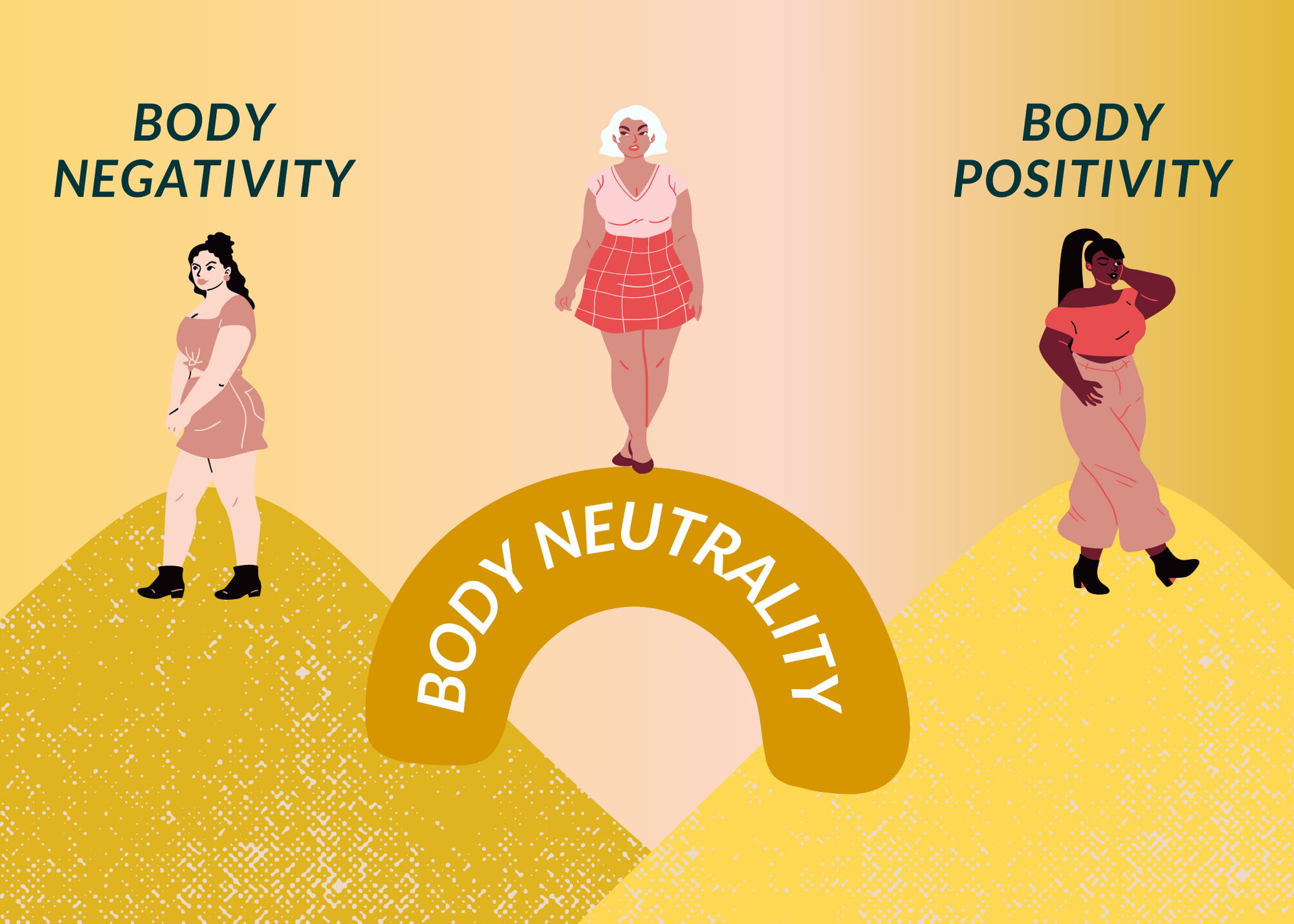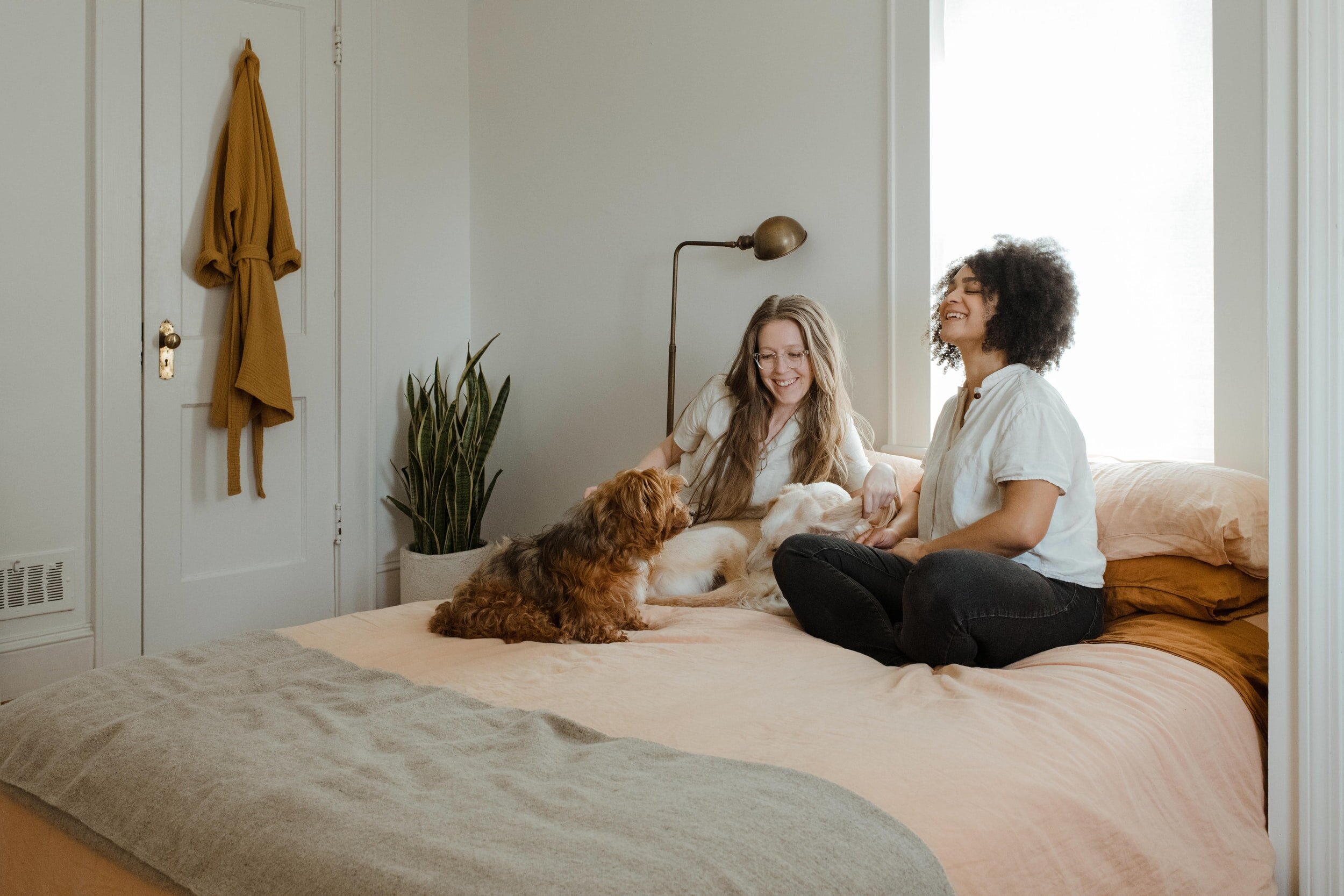Most of us have heard of the body positivity movement, and while its intentions are good, unconditionally loving one’s body and appearance can seem unrealistic to a lot of people, especially when we consider that 80% of women and 34% of men reported being dissatisfied with their bodies That’s why we want to share a middle ground with you, body neutrality, a place where liking your body isn’t a prerequisite for feeling good about yourself.
Before reading, consider how you formed your body image. What factors influenced you? What messages from peers, social media, and societal beauty standards have you internalized? What are your expectations for yourself? What are they based on?
What is body neutrality?
-
Centers on basic respect or acceptance for one’s body over all-out love.
-
Removes guilt for the more difficult body image days.
-
Provides a middle ground between the moments of love for your body and the moments when you may dislike it.
-
It is the understanding that your body is only ONE part of you.
-
Prioritizes what makes your body work/feel good/function best over constant thoughts of losing weight, what you see in the mirror, or how you look.
-
It asks “What does this body part help me do?”, “Is there anything that is good that comes from it?” “Is there space to respect, value, or honor my body in any way?”
-
Challenges you to think about your body as someone you care about. Do you expect perfection?
-
Challenges you to think about where the thoughts of negativity come from.
“The goal of body-neutrality is to dial down the enormous significance that’s being given to physical attractiveness in our society. It goes beyond body-positivity in that it’s not just about pushing back on the specific beauty ideals of our time, but on all aspects of society that continue to promote beauty as essential, consequential, and the ultimate accomplishment, and a person’s appearance as indicative of their worth. ”
How can I practice body neutrality?
Ask yourself these questions:
-
What makes my body work/feel good/function best?
-
What does (chosen body part) help me do?
-
Is there anything that is good that comes from it?
-
Is there space to respect, value, or honor my body in any way?
-
How do I treat my friends? Am I critical or understanding? Do I expect perfection?
-
Am I around others now who are vocally negative about their bodies?
-
What kind of media do I follow and what does it say or imply about bodies? What does it say about how I should look?
-
How has exercise been presented to me?
-
How has food been presented to me?
-
Do those things affect my eating habits, exercise habits, social habits, or mental health?
-
If so, what can I do differently?
Use these Body Neutral Affirmations
-
I deserve to enjoy myself.
-
I deserve to wear clothes I like.
-
I deserve to rest from exercise.
-
I deserve to enjoy food.
-
I know that my body belongs.
-
My body keeps me going and I am grateful for that.
-
I will respect my body.
-
This is my body and I accept it.
Write a thank you letter to your body.
Thank your body for getting you through this life. Pay attention to what your body has gone through and cultivate gratitude for that.
Respect your body.
-
Practice listening to your body and what it needs. Remember, you don’t have to like it to appreciate what it does. After listening, take care of your body. When you’re hungry, eat. When you’re tired, rest. Do this from a place of appreciation and respect.
-
GET RID OF CLOTHES THAT DON’T FIT YOU! Those clothes don’t fit your body. It’s NOT that your body doesn’t fit those clothes.
What is body acceptance?
-
A place where, with practice, you just kind of get there.
-
It is applying radical self-acceptance to your body.
-
Comes from practicing body neutrality, tolerance, cultivating gratitude, appreciation, and respect.
-
It’s noting that 80% of women and 34% of men don’t like their bodies and it’s normal to have a complicated relationship with your body.
-
Acknowledges that the way most of us form body image is based on deeply harmful societal beauty standards and westernized appearance ideals.
-
Acknowledges that some things are out of your control.
-
Accepting and supporting yourself for where you are.
Remember, you are much much more than your body and appearance. Body positivity doesn’t have to be the only answer to alleviate the pain and discomfort created by unattainable beauty standards. You are allowed to love yourself. You are allowed to move through this world comfortably, without the pressure to love what you look like.
Sources: Casey Stover. Body neutrality concept originated at Vermont Wellness Retreat Green Mountain at Fox Run.
WANT TO READ MORE? CATCH UP ON OUR LATEST BLOGS BELOW.
Previous Blog Post
Next Blog Post











Nov 17, 2021
Nov 17, 2021
Stress is a state of mental or emotional strain or tension resulting from adverse or very demanding circumstances. It is the body’s physical response to a real or perceived threat, demand, or danger.
Everyone experiences stress at different levels. Even when the same stressors are present, our experiences can be different. Certain groups experience higher levels of stress, for example, communities of color, LGBTQIA+, women, and parents.
Stress isn’t always harmful. For example, think about the motivation you feel to study for your next exam, or the urge to make a to-do list on a Sunday. These are positive ways that stress can help you focus and complete tasks. But when stress is frequent and intense, it can affect your overall health, resulting in a reduced quality of life.
This is why we want to help you get to the root cause of your stress, understand the ays it manifests for you, and learn preventative tools for coping with stress. Because you deserve a healthy, happy life.
Nov 17, 2021